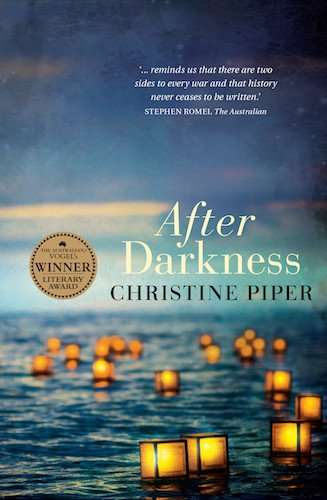After Darkness by Christine Piper, Book Review: Captivating prose
Christine Piper’s After Darkness won The Australian/Vogel’s Literary Award 2014 and then long-listed for the Miles Franklin Award 2015.
 After Darkness Synopsis:
After Darkness Synopsis:
It is early 1942 and Australia is in the midst of war.
While working at a Japanese hospital in the pearling port of Broome, Dr Ibaraki is arrested as an enemy alien and sent to Loveday internment camp in a remote corner of South Australia. There, he learns to live among a group of men who are divided by culture and allegiance. As tensions at the isolated camp escalate, the doctor’s long-held beliefs are thrown into question and he is forced to confront his dark past: the promise he made in Japan and its devastating consequences.
“A brave, profound meditation on identity, trauma, loss and courage. A novel that demands its place alongside Richard Flanagan’s The Narrow Road to the Deep North and Mark Dapin’s Spirit House.” — Stephen Romei
Disclosure: If you click a link in this post we may earn a small commission to help offset our running costs.
Sign up to our Booklover Book Reviews emails and receive our gift for new subscribers. LEARN MORE >>
BOOK REVIEW
After Darkness, the debut novel from Aussie author Christine Piper, is something special. It is everything literature should be.
literature: a body of artistic writings of a country or period that are characterized by beauty of expression and form and by universality of intellectual and emotional appeal
The opening lines are immediately engaging. Although a reserved personality outwardly, the narrative voice of Dr Ibaraki is open, perceptive and without pretence. Piper fills her descriptions of the Australian landscape with emotion, artistry and a sense of longevity.
Gazing at the mallee trees as we walked to the river, I once more admired their inconspicuous quality, the grey-greeen leaves that stirred so gently in the breeze. Taking a wider perspective, I realised that every element of the landscape — from the grass and trees to the pebbly earth — seemed at pains not to outdo the others, and it struck me as a very noble quality indeed.
Structure and prose
Multiple narrative streams convey Dr Ibaraki’s story. These serve as windows into different time periods and experiences in his life. By alternating between these narrative streams Piper subtly cultivates tension and propels the reader onward to the surprisingly satisfying conclusion. I found this novel very difficult to put down.
There is an understated and refined, almost ageless quality to Piper’s prose. It is actually the quieter passages of a concerto that draw in the listener and heighten their emotional engagement. Piper clearly understands this and translated that knowledge to the pages of After Darkness.
But I was most impressed by Piper’s avoidance of sensationalism while writing so openly about discrimination and atrocities of war. She exposes the light in the dark without subjecting readers to cloying sentimentality. In addition, an unerring respect for all people is what sets After Darkness apart from its peers. This is certainly key to the story’s universal appeal and currency in today’s society.
In summary, admiration best describes my response to this novel. After Darkness is captivating and haunting for all the right reasons; the work of a truly gifted writer that all should have the opportunity to read.
BOOK RATING: The Story 5 / 5 ; The Writing 5 / 5
Get your copy of After Darkness from:
Booktopia(Aus) | Book Depository | Amazon
Genre: Literature, Drama, Historical
This review will count towards my participation in the Aussie Author Challenge 2014 and the 2014 Australian Women Writers Challenge.
About the Author, Christine Piper
Christine Piper‘s short fiction has been published in Seizure, SWAMP and Things That Are Found In Trees and Other Stories. She was the 2013 Alice Hayes writing fellow at Ragdale in the United States. Piper has studied creative writing at Macquarie University, the Iowa Writers’ Workshop and the University of Technology, Sydney. While at UTS she wrote a version of this novel as part of her doctoral degree. She has also worked as a magazine editor and writer for more than a decade.
Christine was born in South Korea in 1979 to an Australian father and a Japanese mother. They moved to Australia when she was one. She has taught English and studied Japanese in Japan, but now lives in New York with her husband and daughter. Christine is also the 2014 recipient of the ABR Calibre Prize for an Outstanding Essay. After Darkness, her first novel is the winner of The Australian/Vogel’s Literary Prize 2014.
Check out Christine Piper’s website and connect with her on Twitter
Other reviews of After Darkness
Goodreads, Sydney Morning Herald, Incredible Rambling Elimy, All The Books I Can Read
Receiving a paperbook copy of this title from Allen & Unwin did not impact the expression of my honest opinions in this review.
